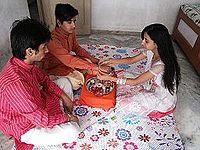The typical Raksha Bandhan festival as observed between brother-sister starts with the sister(s) selecting a colorful rakhi, a form of woven bracelet, ahead of the festival.[8] On the day of the festival, she meets her biological brother(s), cousins, or adopted brother-like friend, along with the whole family.[51] In parts of north India, women may travel to visit their brothers, typically their natal homes.[8] She ties the rakhi on his wrist on the raksha bandhan day. After the band is in place, states Melton, the brother and the sister pray for each other's well being. The sister applies a tilak (tikka), a colorful mark on the forehead of the brother.[51]After the tilak, she performs an aarti.[51] In return, the brother pledges to protect her and take care of his sister under all circumstances.[51] The brother may give his sister(s) gifts or some money, and they may also feed each other with sweets.[51][52]According to Jack Goody, these traditional rituals connote "a symbol of mutual dependence and a mark of respect" between the brother and the sister.[8] The brother, states Goody, may wear the rakhi thread for many weeks through the Diwali, or just for the day or two.[8]
Anthropologist McKim Marriott in his "Little Communities in an Indigenous Civilization," (1955) describes an "Indian-wide" tradition of Rakhi-bandhan, or Raksha-bandhan, in which a priest ties charms around their patrons' wrists and receives gifts of money, and a local tradition of Saluno in Aligarh district of North India in which sisters place ears of sacred grains on the heads and behind the ears of their brother in affirmation of the brother's role as their real or potential protector.[53][54] Marriott's work also describes the field study of anthropologist Alan R. Beals in Namhalli, a village near Bangalore, who notes changes in the rakhi tradition brought on by modern technology.[54]



No comments:
Post a Comment